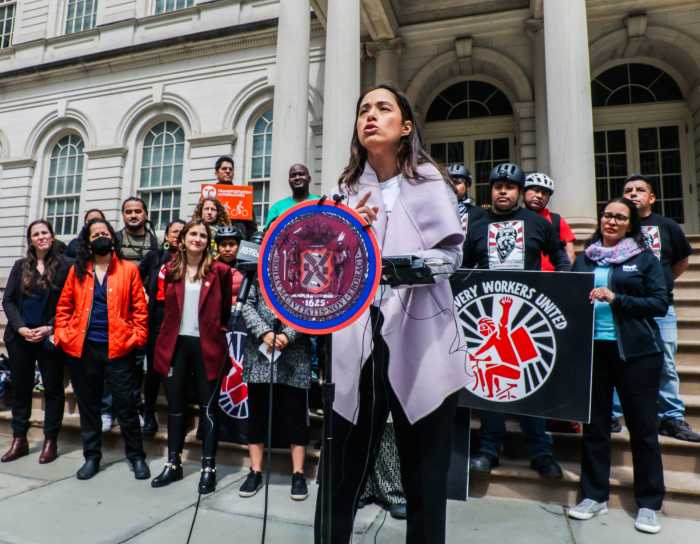
Yetta Kurland with C. Virginia Fields, right, and Erica Vargas, a political and legislative analyst for District Council 37, left, at a June 3 fundraiser for Kurland.
BY GERARD FLYNN | When Yetta Kurland, 43, a civil rights attorney, ran for the City Council’s Third District in 2009 she was up against a political powerhouse: the incumbent Christine Quinn, who has held the so-called “gay seat” since 1999.
Quinn’s win was no doubt helped along by key support from powerful unions and local politicians like then-state Senator Tom Duane, her mentor and former boss, calling it a “slam dunk.” But Kurland put up a surprisingly strong challenge for the mostly West Side district, which spans the length of Hell’s Kitchen and extends through Chelsea and the Village down to Canal Street.
The second time around, the “Yetta Kurland Live!” radio show host faces another Duane favorite, Corey Johnson, 31, the chairperson of Community Board 4 (Chelsea/Clinton), who, like Kurland, is openly gay. (Kurland actually had to suspend her radio show due to her campaign, with her last broadcast airing on May 22.)
It’s shaping up to be a dynamic contest between the self-described “poor kid” from Upstate New York and her opponent and fellow activist, who made a name for himself when he became the nation’s first out high school football team captain. A lesser-known candidate, Alexander Meadows, is also in the race, though he is trailing the other two candidates in the fundraising stakes.
While Kurland and Johnson both talk “progressive” views on issues like healthcare, gay rights, education and affordable housing, Johnson has been getting the lion’s share of endorsements.
With support from Duane, Congressmembers Jerrold Nadler and Barney Frank of Massachusetts, new state Senator Brad Hoylman and Assemblymember Richard Gottfried, as well as powerful labor unions, like the United Federation of Teachers and 1199 SEIU, Johnson is seen by some as the front-runner.
“Corey Johnson is a progressive, proven leader who gets results — on affordable housing, access to quality education, preventing overdevelopment and protecting civil rights,” Nadler said. “He has been a thoughtful and valuable partner on a variety of local matters, and I’m very proud to endorse him for the City Council’s Third District.”
Johnson has also been sweeping the endorsements of local Democratic political clubs, including Village Independent Democrats, Downtown Independent Democrats, Chelsea Reform Democratic Club and Village Reform Democratic Club, plus also has the support of the Working Families Party.
In addition, in a recent New York Times article that announced Duane was supporting him, Johnson came out as HIV-positive.
But to guests at a fundraiser for Kurland on Monday evening, her election campaign is very much in the running, with three months to go before the September 10 primary.
The fundraiser was organized by the Women’s Democratic Club and held at the loft of Virginia Davis in the West Village. A buoyant Kurland described her campaign as going very well, and said she was excited following the first day of a petition drive to get her name on the ballot.
Kurland was remembered for her work during the recovery from Hurricane Sandy and the fight to stop the closing of St. Vincent’s Hospital. She said that of all the issues facing the next city councilmember, a new hospital should figure prominently.
Calling Johnson the “establishment figure,” Kurland’s supporters said his connections and endorsements are certainly helping, but added that noteworthy labor and political support was also getting behind their candidate’s campaign. For her part, Kurland has garnered endorsements from the New York Metro Area Postal Union and more importantly, District Council 37, the city’s largest public workers’ union.
A union representative, who asked not to be named, said Kurland’s leadership in attempts to save St. Vincent’s had garnered her “great respect” and was part of the reason for their support, as well as her commitment to low-wage employees.
In formally announcing her endorsement, C. Virginia Fields, the former Manhattan borough president, was joined by Betsy Gotbaum, the city’s former public advocate.
Fields described Kurland’s chances of taking Quinn’s seat as “very good.”
She praised Kurland’s record on affordable housing and healthcare and added that while name-brand support from the establishment is “always good,” it doesn’t necessarily mean victory.
“I think today people are making decisions independent of the establishment,” Fields said.
Recalling a prior political victory of hers, the former borough president said, “In my case, I ran against an incumbent and we went to the voters and made our case. Running against recognition makes you work harder but it is not something not doable.”
Even if Johnson is ahead in the endorsements race, it wouldn’t be the first time that Kurland has been playing catch-up. In terms of campaign funds, Johnson quickly raised his maximum spending limit by last July. According to the most recent data from the Campaign Finance Board, he has raised $176,000 as of May 15, with almost $100,000 remaining for the race’s homestretch.
Kurland, on the other hand, is trailing in dollars, with total receipts of more than $133,616, leaving her with a remaining balance of just under $50,000, as of last month.
For his part, Johnson bristled at the idea of Kurland’s supporters trying to portray him negatively as the “establishment” candidate, simply because he is winning the vast majority of endorsements.
“I’ve spent the past decade as a community activist on the West Side working with residents and community leaders on affordable housing, fighting against overdevelopment and advocating on behalf of middle-class New Yorkers,” Johnson said. “Congressman Jerry Nadler, former state Senator Tom Duane, Assemblymember Dick Gottfried, state Senator Brad Hoylman, the Village Independent Democrats, the Village Reform Democratic Club and many others have endorsed my campaign. These leaders are not the establishment — they are progressive champions on the West Side, and I’m deeply honored to have received their support.”





































